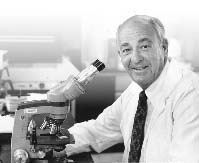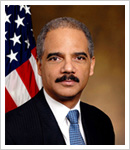Forensic medical expert Cyril H. Wecht provides a vitally needed defendant's perspective on the terrible Justice Department misconduct that USA Today just documented in a major investigation.
On Sept. 23, the paper reported 201 criminal cases in which federal judges found that prosecutors broke laws or ethics rules since 1997. Overall, the abuses put innocent people in jail, and set guilty people free.
Dr. Wecht's prosecution didn't fall within the newspaper's scope because his first judge in Pittsburgh coddled the prosecution instead of criticizing it. But we at the Justice Integrity Project, a non-partisan legal reform group, documented Wecht's ordeal from 84 overblown felony charges in 2006 carrying long prison sentences for trivial matters. He was vindicated last year at age 78.

We asked him to describe what a defendant can face, in general.
"Once a victim has been targeted," he responded, "there are no limits to the amount of time, energy, money, and use of personnel that the Feds will employ to pursue and persecute that individual. No charge will be considered too petty or unimportant in their efforts to coerce the victim into pleading guilty to avoid the frightening possibility of a lengthy jail term."
Wecht, who holds both M.D. and J.D. degrees, is a world-famous consultant in his specialty of forensic medicine. Also, he's a longtime professor of medicine, a leader of medical societies and the author of more than 550 professional publications and many books. Moreover, he's an outspoken expert on celebrity deaths, including his courageous criticism of the federal government's official account of the single-bullet theory for the 1963 assassination of President Kennedy.
For 20 years prior to his indictment, he had been elected as the part-time, $65,000-a-year coroner for Allegheny County in Western Pennsylvania, where he was also Democratic county chairman.
Most of the federal charges that the Bush Justice Department brought against him were for sending 43 personal faxes that cost his county an estimated grand total of $3.86, according to ours and other published accounts. The costs were simply for the nominal phone charges and electricity, but were masked in the indictment by portentous-sounding allegations of "fraud." The other charges were similarly trivial, such as disputed reimbursement on his mileage expenses as coroner.
His cost to defend himself? Some $8.6 million for his attorneys, who included former Attorney Gen. Richard Thornburgh, a Republican former Pennsylvania governor. The attorneys estimate that taxpayer costs were at least as high for the prosecution, which declines comment.
The Bush DOJ brought the case via Mary Beth Buchanan, an ambitious Republican U.S. attorney who had previously directed all 93 of DOJ's U.S. attorneys from her office at DOJ's Washington headquarters during 2005.
This was the same year her colleagues were seeking ways to ensure that "loyal Bushies," as one top DOJ official wrote White House advisor Karl Rove, would fill the powerful regional U.S. attorney posts as the 2006 election season heated up. Buchanan then returned to Pittsburgh as U.S. attorney to burnish her image as corruption fighter before her run for Congress.
Under the federal theory of the Wecht prosecution, authorities can bring similar charges against almost any local or federal government worker who uses a government-owned computer or phone. Such investigations bring under federal scrutiny the addressee of any such communications, however innocuous. This increases the scope of federal jurisdiction to a mind-boggling proportion of the population, such as relatives and friends of government workers.
Wecht further explained:
When there is a politically motivated (obviously, never publicly expressed) etiology in such a federal prosecution, and especially where the selected victim enjoys some degree of celebrity, then the intensity of the criminal lawsuit is ratcheted up several notches.
Wecht, a past president of the American Academy of Forensic Sciences and also the American College of Legal Medicine, assessed the dilemma faced by unfairly accused defendants on whether to plead guilty:
For defendants, fighting is incredibly expensive, emotionally draining, and usually quite protracted. That is why the Feds can boast of a 95% success rate in guilty pleas. Very few people are capable of engaging in an all-out battle against the multi-facetted, unlimited forces that the DOJ, FBI, and other federal governmental agencies will muster in achieving their objective.
In addressing the abuses, USA Today provided a well-indexed regional chart of judicial opinions. They augmented it with such other experts as Pace University Law School Prof. Bennett Gershman, who literally wrote the book on "Prosecutorial Misconduct."
These problems increasingly alarm legal experts on the political right, left, and in-between. The free-market Cato Institute, for example, held a compelling forum last year featuring two of its scholars with new books on the topic, Harvey Silverglate (Three Felonies a Day: How the Feds Target the Innocent) and Timothy Lynch (In the Name of Justice).

Last week's newspaper project focused only on judicial findings of misconduct. But our research shows the harm is worse when judges ignore official law-breaking or, as occasionally the case, encourage rogue prosecutors.
As the country nears mid-term evaluation of the Obama administration, its Attorney Gen. Eric Holder, above, declined to answer questions from USA Today about its project. That's congruent with DOJ's pattern. Holder declined also to take questions at the University of Alabama Law School last week after boasting there about the Obama DOJ's civil rights record.
He must have known he'd face criticism about why he and his minions have argued for 20 more years in prison for the state's last Democratic governor, Don Siegelman, 64, whose convictions largely rests on his asking a wealthy man to donate to an education non-profit in 1999.
Alabama-based legal commentator Roger Shuler, one of the pioneering reporters documenting such Bush-era DOJ crusades in the Deep South, today published, "USA Today Investigation Scratches the Surface of Decay in U.S. Justice System." Harper's columnist Scott Horton a few days earlier characterized the paper's project as showing, "An Ethics Meltdown at the Justice Department."
Wecht's expertise, suffering and victory entitle him to the last word:
The flagrant abuse of governmental power by the DOJ and FBI in attempting to destroy an individual ─ financially, professionally, socially, and sometimes physically for personal and political reasons, and to an extent that is grossly disproportionate to any alleged act of criminality ─ is the hallmark of a totalitarian government.
All decent, fair-minded American citizens ─ liberal Democrats or conservative Republicans ─ need to let their voices be heard in denouncing such deplorable, dangerous tactics.